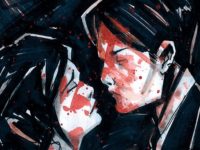It’s hard, if you really listen, not to be startled when 1955’s “Bo Diddley” — all fast-driving rhythms and nervy aggression — gets going. Diddley ditched chord changes for propulsive determination well over half a century ago, and it’s still news. Like its namesake, “Bo Diddley” is something you can’t get out of your head. Perhaps that’s because the song, reduced to stark simplicity, is almost all rhythm.
As we mark the June 3, 2008 anniversary of Bo Diddley’s passing, there’s no question that rock music was better for it. By speeding up and pushing forward the traditional rumba beat, not to mention adding some searing guitar distortion, Diddley opened a door that the British Invasion, punk music, hip hop and new wave would later rush through.
Still, for all of Bo Diddley’s — and “Bo Diddley’s” — coiled revelation, that “shave-and-a-haircut, two-bits” beat didn’t start with the man who made it famous. The sound, called kpanlogo, originates from Ghana, West Africa. Typically, it involves two drummers — with the supporting player keeping time while the leader solos. But Diddley had a flair for self promotion that belied his hard-scrabble roots.
Born Otha Ellas Bates but said to have been abandoned in McComb, Miss., Bo Diddley subsequently took the name Ellas McDaniel after a cousin who adopted him. He became known as Diddley during a brief career as a boxer. Later, he began singing in between odd jobs, and found his muse in the signature elements of music by John Lee Hooker, Louis Jordan and Muddy Waters. “Bo Diddley” (featuring Waters sideman Otis Spann on piano, by the way) was all of that, only buried beneath this remarkable rhythm — something which subsequently simply became known as “the Diddley beat.”
Well, not quite, of course: A similar rhythm drove “Hambone” by Red Saunders and his Orchestra a full three years before — with Delores Hawkins providing some memorably big howls. Kpanlogo-style drumming, in fact, made several appearances in the previous decade, notably showing up on a post-war Gene Krupa recording. “Bo Diddley” even bears a passing resemblance to Gene Autry’s 1942 hit “(I’ve Got Spurs That) Jingle, Jangle, Jingle.”
Bo Diddley, however, took his custom-made rectangular guitar and bashed people over the head with so many self-referential efforts that we soon forgot about all that. He followed “Bo Diddley” with “Bo Diddley’s A Gunslinger,” “Hey, Bo Diddley,” “Bo’s A Lumberjack” and “Diddley Daddy,” among many, many others.
Bo loved him some Bo, alright. And now so assuredly do we. Clearly, Red Saunders needed a better PR rep. What he needed, of course, was Bo Diddley.
- Nick DeRiso’s Best of 2015 (Rock + Pop): Death Cab for Cutie, Joe Jackson, Toto + Others - January 18, 2016
- Nick DeRiso’s Best of 2015 (Blues, Jazz + R&B): Boz Scaggs, Gavin Harrison, Alabama Shakes - January 10, 2016
- Nick DeRiso’s Best of 2015 (Reissues + Live): John Oates, Led Zeppelin, Yes, Faces + others - January 7, 2016




I’m a longtime family friend and I read “said to have been abandoned”.
That NEVER happened. His mother’s older cousin Mama Gussie, offered to care for Bo because Mama Ethel (his mother) was having trouble feeding two boys in rural Mississippi. It was common for black Americans to move north to Chicago for a better life, and Mama Ethel wanted Ellas (Bo) to have the opportunity that life in McComb, Mississippi was never going to offer to her young son.
Scott “Skyntyte” Free
Bo once said, “I opened the door for a lot of people and they left me holdin’ the knob.” There are still people running, walking, or even coasting through that door, and sadly, too many of them don’t even know who Bo was. I think this says it all:
https://en.wikipedia.org/wiki/Bo_Diddley#Accolades
RIP, Bo.